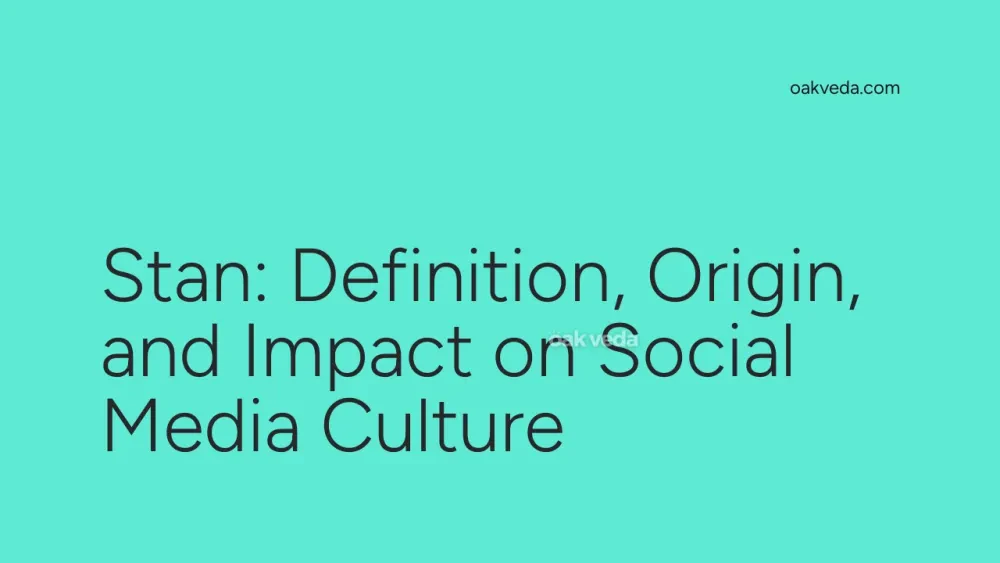
What is Stan?
In the realm of social media, a "stan" refers to an extremely passionate and dedicated fan of a celebrity, musician, or public figure. The term has become a ubiquitous part of online fan culture, often used to describe individuals who show unwavering support and enthusiasm for their favorite stars.
Origin and Development of Stan
The term "stan" has an interesting origin that dates back to the early 2000s. It's believed to have been derived from the 2000 Eminem song "Stan," which tells the story of an obsessive fan. The word itself is a portmanteau of "stalker" and "fan," initially carrying negative connotations.
However, over time, the meaning of "stan" has evolved. While it still retains some of its original intensity, it has largely shed its negative associations and is now used more positively to describe highly engaged and supportive fans.
How Stan Works in Social Media
On social media platforms, "stan" is used both as a noun and a verb. As a noun, it describes a person who is a devoted fan. For example, "I'm a Taylor Swift stan." As a verb, it means to be an enthusiastic supporter of someone or something: "I stan BTS and their music."
Stans often use the term in hashtags to identify themselves and connect with other fans. Common examples include #ArianaStans, #MarvelStans, or #BeyHive (for Beyoncé stans).
Popular Examples of Stan Culture
Stan culture is prevalent across various social media platforms, with some fandoms gaining particular notoriety:
- K-pop Stans: Fans of Korean pop music, especially groups like BTS and BLACKPINK, are known for their intense dedication and online presence.
- Arianators: Ariana Grande's fanbase is highly active and supportive on platforms like Twitter and Instagram.
- Swifties: Taylor Swift's fans are known for their loyalty and ability to decode hidden messages in her work.
Impact of Stan Culture on Social Media
Stan culture has significantly impacted social media dynamics and online interactions:
- Community Building: Stans often form tight-knit online communities, providing support and a sense of belonging to members.
- Trend Setting: Stan accounts can influence trends, from popularizing certain phrases to driving engagement on specific topics.
- Marketing Power: Brands and celebrities leverage stan culture for promotion and engagement.
- Activism: Some stan communities use their collective power for social causes, raising awareness and funds for various issues.
Controversies Surrounding Stan Behavior
While stan culture can be positive, it also has its downsides:
- Cyberbullying: Some stans engage in online harassment of those who criticize their favorite celebrities.
- Obsessive Behavior: Extreme stan behavior can lead to unhealthy obsessions and parasocial relationships.
- Echo Chambers: Stan communities can sometimes become echo chambers, discouraging critical thinking about their idols.
How Brands and Influencers Use Stan Culture
Savvy brands and influencers have learned to harness the power of stan culture:
- Engagement Strategies: They create content that resonates with stans, encouraging shares and interactions.
- Exclusive Content: Offering "insider" information or behind-the-scenes content to reward loyal fans.
- Collaborations: Partnering with popular stan accounts or influencers to reach wider audiences.
Future Trends Related to Stan Culture
As social media continues to evolve, so does stan culture:
- Increased Brand Involvement: More companies are likely to tap into stan communities for marketing.
- Platform-Specific Stan Behavior: Different platforms may see unique manifestations of stan culture.
- Ethical Considerations: There may be more discussions about the ethics of parasocial relationships and fan behavior.
FAQs about Stan Culture
-
Is being a stan always negative? No, while the term originated with negative connotations, it's now often used positively to describe passionate fans.
-
Can you stan something other than a person? Yes, people can stan TV shows, movie franchises, brands, or even concepts.
-
How do I identify a stan account on social media? Stan accounts often have profile pictures of their favorite celebrity, use fan-specific language, and frequently post about their idol.
-
Is stan culture the same across all social media platforms? While there are similarities, stan behavior can vary across platforms due to different features and user demographics.
-
How can I engage with stan culture in a healthy way? Enjoy being a fan, but maintain perspective. Remember that celebrities are human, and it's important to have a balanced life outside of fan activities.
In conclusion, stan culture has become an integral part of social media, shaping online interactions, marketing strategies, and even social movements. While it offers a sense of community and passion for many, it's important to engage with it mindfully, balancing enthusiasm with respect for others and maintaining a healthy perspective on celebrity culture.
You may be interested in:
- Linktree: Definition, Origin, and Impact on Social Media
- Retweet: Definition, Origin, and Impact on Social Media
- Ick: Definition, Origin, and Impact on Social Media Culture
- Retargeting: Definition, Origin, and Impact on Social Media
- Innit: Definition, Origin, and Impact on Social Media
- AI in Social Media: Definition, Origin, and Impact

